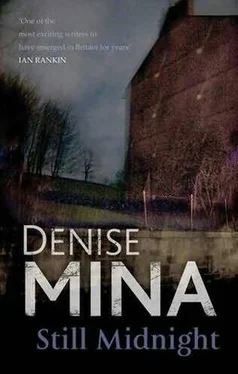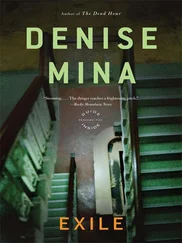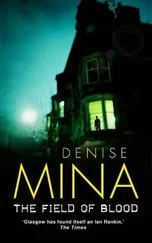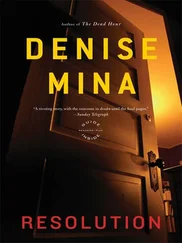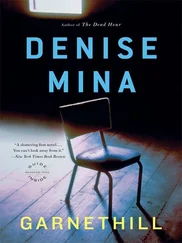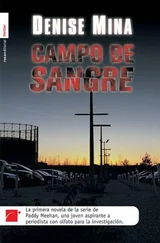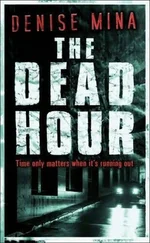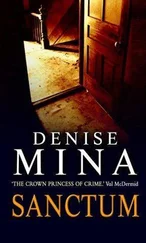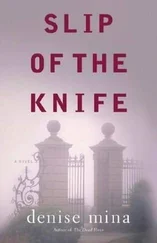The close was straight across the road and the outside door didn’t give a good account of the neighbourhood. Wired glass scarred with poorly drafted graffiti in felt tip. Names on the intercom were messy, biroed onto stickers, stuck over the outside of the perspex. Something dark yellow, possibly paint, had been spilled on the red floor tiles and scrubbed into the grout.
Nestled in among the messy names ‘J. Lander’ was typewriter-written in an old-fashioned font, the plastic over his name was clean, as if he had tended it carefully over the years. Morrow pressed the button.
‘Hello?’
‘Is this Mr Lander?’
‘It is indeed.’ His voice was high but steady, neat, like his name plate. ‘Who is this?’
‘Mr Lander, we’re from Strathclyde CID. We’d like to speak to you concerning Mr Anwar.’
‘Of course.’ The door clicked open in front of them and Lander came back on the intercom. ‘Two up, first on the left.’
Morrow thanked him and he hung up.
The inside of the close was clear, no piles of rubbish bags or discarded furniture, well tended but the building was in bad shape: a white plastic mobility handrail had come loose from its shorings at one end and was resting forlornly on the floor, as spent as the tenant who had requested it. The walls above the skirting board were damp-bubbled, crumbling but held together with thick burgundy gloss paint. The imprint of a heel in the skin of paint had burst a bubble and white plaster powder had been walked up and down the steps.
Above in the echoing stairwell a door opened. Footsteps clipclopped out onto the landing and a man called over the balcony, ‘Hello?’
‘Hello?’ Morrow led Bannerman up the stairs. ‘Mr Lander?’
‘Aye, that’s you, come on,’ he said, guiding them, as if there was any way of getting lost in a close. ‘Up this way.’
Morrow looked up and saw a small man in his sixties leaning over the rail, big hands clutching the banister. Brown cardigan, grey slacks with stay-press seams down the front, a neat white moustache no wider than his mouth, grey hair that had been tidied with a watered comb.
‘Good morning, officers,’ he said, withdrawing as soon as he was sure they had seen him and knew where to go.
Morrow reached the top of the stairs first and followed him through the brown front door. His front step was dust free, the ‘welcome’ mat clean and square to the door.
She stepped into a moss green hallway and found Lander standing patiently at the door to the living room, watching behind her for Bannerman. When Grant stepped into the hallway behind her and shut the door Lander nodded, muttered a little orderly, ‘Uh huh’ to himself and went into the living room, ready to receive them.
The hall had a single shelf above the radiator with a bowl for keys on it. On the back of the door was a single peg for a scarf. No coats chucked on chairs, no bags dumped on the floor, no shopping bag of rubbish left hanging on a handle ready to be taken out when someone remembered.
Morrow followed Bannerman into the living room.
An old-fashioned box television sat on a low table. A small settee in orange velvet and matching armchair, both old but well preserved. Hanging on the arm of the chair was a cloth pocket for TV remotes and a booklet of the weekly television listings inside. There was nothing in the living room that was not functional or essential, no display cabinet of half-loved ornaments or better-day mementoes, no unread newspapers. It was more than bachelor-flat tidy. It was institutional tidy. Morrow made a mental note to check for a prison record.
They stood in front of the settee in a perfect equilateral triangle. Bannerman looked at Morrow expectantly, telling her to take charge of the questioning, as if he was saving his own moves for the more important interviews.
‘Please,’ said Mr Lander, taking the prompt for himself, opening his hand to the settee. ‘Sit down.’
Against his orders Morrow sat in the armchair, and saw Lander’s eye twitch. He would have to sit next to Bannerman on the settee, sandwiched between them. He pulled his trousers up at the knees with an irritated flick of the wrist and sat down.
Morrow looked around. The electric bar fire was surrounded by framed photographs. She expected to see a wife, grand-children, perhaps a mother in a formal pose but instead found photographs of Lander in military uniform, standing among friends in uniform.
‘A military man?’ she said, apropos of nothing. Bannerman looked up, suddenly interested.
‘Yes.’ His tone was clipped. ‘Twenty years in the Argyll and Sutherland Highlanders. Ten served in the First Battalion and then a further ten years in E Company.’ As if he sensed her reservations he said, ‘E Company is the TA.’
The intense attraction of order had a pull over her too. She had considered the army herself. ‘Dedicated,’ she said.
‘Yes,’ he said and thought about it. ‘Yes.’ Patting his knees with his open hands he turned to Bannerman. ‘So, tell me about Mr Anwar. Do you know who took him?’
They weren’t supposed to give away any information, but a stonewall was often cold news to an interviewee so Bannerman tempered it. ‘Well, Mr Lander, I’m sure you’ve seen the papers. We really can’t say anything other than what’s in there-’
‘He was taken by gunmen demanding a ransom?’
‘Yes-’
‘And Aleesha was shot in the hand?’
‘-But what I can tell you is that Mr Anwar was kidnapped last night for a money ransom. Do you know anything about that?’
‘Other than what was on the radio,’ Lander breathed heavily through his nose, as if he was holding back a strong emotion, ‘all I know is I got a call this morning from his cousin, ’ he said the word disapprovingly, ‘telling me that I was not required this morning because Mr Anwar had been indisposed last night. I had to dig for information. He’s over there.’ He nodded out the window. ‘Now. Working the shop for him.’
Bannerman carried on. ‘Is Mr Anwar a popular man? With locals?’
‘Popular?’ Lander’s eyes searched the carpet. ‘Well, people come into the shop a lot.’
‘The same people?’
He nodded. ‘Often the same people. There’s a bus stop outside so people on their way to town often come in for a paper but after rush hour in the morning and the afternoon our customers are mostly locals, yes.’
‘How long have you worked there?’
‘About fourteen years. Nearly fourteen years.’
‘And what shifts do you do?’
‘Ooh.’ He rolled his eyes up. ‘Well, I start at six thirty a.m. and finish at twelve thirty. But I often stay on or go back in for the afternoon shift, help with the lunchtime rush and stocking up and so on. Sometimes I go back in to listen to the cricket with Mr Anwar.’
Morrow chimed in, ‘So, he’s a friend?’
‘Very much so,’ said Lander seriously. ‘Very much a friend.’
‘Are you paid for those extra hours?’
He seemed offended at the suggestion. ‘In the afternoon?’
‘Yes.’
He gave a small cheerless laugh. ‘Paid for listening to cricket matches?’
Morrow blinked slowly. ‘When you work extra hours are you paid for them?’
Lander’s expression hardened towards her. ‘No. I’m paid for my shift in the morning. Anything else I can do for Mr Anwar is a gesture of friendship.’
‘You do it out of loyalty?’ She meant it as a compliment but he seemed to have taken against her.
The lip beneath his moustache tightened. ‘And friendship.’
‘I am just asking ye questions, Mr Lander.’ Her voice was soft. ‘It’s my job to find Mr Anwar and bring him back safe and sound. I take it very seriously.’
‘Good,’ he said and blinked. She realised suddenly that he was terrified for his friend.
Читать дальше
